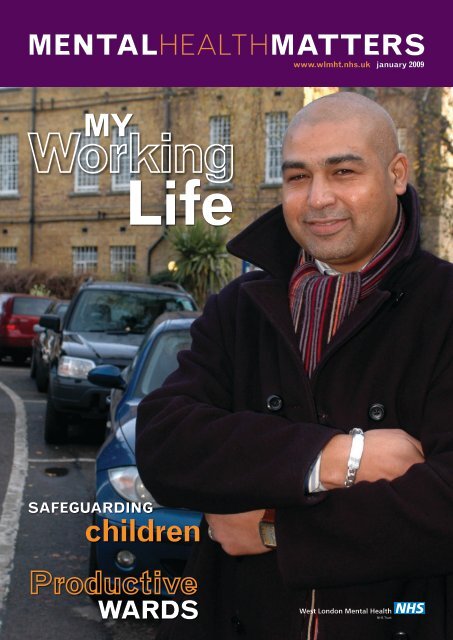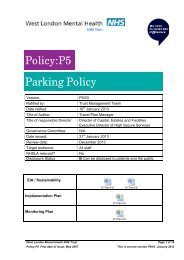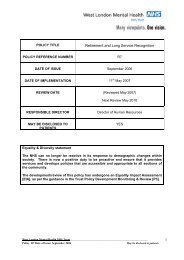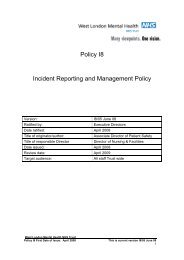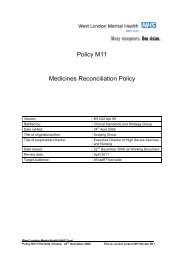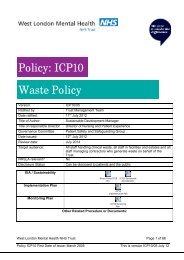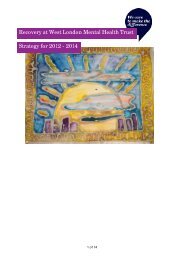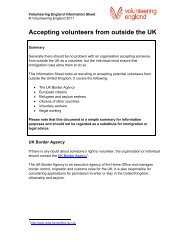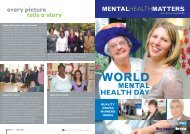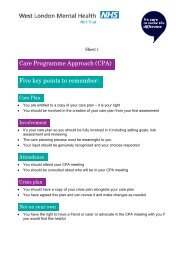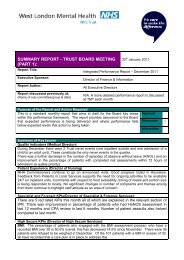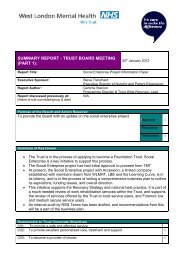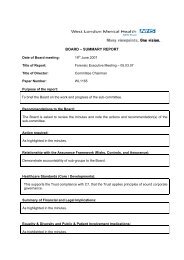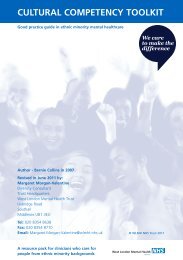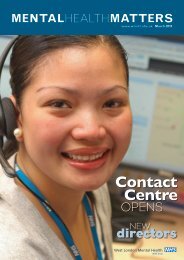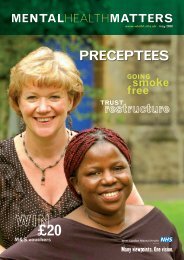children - West London Mental Health NHS Trust
children - West London Mental Health NHS Trust
children - West London Mental Health NHS Trust
Create successful ePaper yourself
Turn your PDF publications into a flip-book with our unique Google optimized e-Paper software.
MENTALHEALTHMATTERS<br />
www.wlmht.nhs.uk january 2009<br />
My<br />
Life<br />
Safeguarding<br />
<strong>children</strong><br />
wards<br />
MENTALHEALTHMATTERS 1
simonsays<br />
Welcome to the january issue of<br />
<strong>Mental</strong> <strong>Health</strong> Matters<br />
I would like to wish you all<br />
a very happy new year and I<br />
would like to thank you for<br />
the work you have done at the<br />
trust during the holiday period.<br />
By keeping services running<br />
smoothly at this time staff have<br />
shown their usual high levels<br />
of commitment to patients and<br />
the trust. May I remind you that<br />
this can be a particularly difficult<br />
time of year for some of our<br />
patients and of the need for<br />
extra vigilance.<br />
For some the new year can be a<br />
time of reflection but for others<br />
it is a time for new beginnings.<br />
With that thought in mind it<br />
is with great pleasure that I<br />
welcome Nigel McCorkell to<br />
the trust as our new chairman. I<br />
was very sorry to see Louis go<br />
at the end of last year but am<br />
glad to welcome to the board an<br />
experienced <strong>NHS</strong> professional<br />
with a strong private sector<br />
background. I am sure he will<br />
learn about the organisation<br />
quickly by getting out and about<br />
to meet staff around the trust.<br />
You can read more about Nigel<br />
further down the page.<br />
As an organisation we must<br />
look forward positively to the<br />
new year. Last year had its<br />
challenges, for example with the<br />
restructuring of the trust into<br />
the five SDUs. Now that the<br />
SDUs are up and running we<br />
should look forward to more<br />
stability and the opportunity to<br />
grow as an organisation.<br />
Safety and security are two<br />
agendas which are set to<br />
increase significantly this year.<br />
It is our responsibility to make<br />
sure that healthcare is being<br />
New chairman announced<br />
Nigel McCorkell has been<br />
appointed as Chairman of the<br />
<strong>Trust</strong>. Nigel took up the post on<br />
5 January 2009 and will serve<br />
the trust until 4 January 2013.<br />
Nigel is a qualified accountant<br />
with a background in the private<br />
sector including, corporate<br />
finance, aerospace and software<br />
sectors. He was vice chair<br />
of St Mary’s <strong>NHS</strong> <strong>Trust</strong> for<br />
eight years leaving at the time<br />
of merger with Imperial. He<br />
chaired the board of governors<br />
at Bournemouth University for<br />
twelve years until he retired in<br />
2004. He says, “I am delighted<br />
to have been appointed as chair<br />
of <strong>West</strong> <strong>London</strong> <strong>Mental</strong> <strong>Health</strong><br />
<strong>NHS</strong> <strong>Trust</strong> and look forward to<br />
working with the board and staff<br />
throughout the <strong>Trust</strong>.”<br />
practised safely and in a secure<br />
environment for both staff and<br />
patients. The baby P case which<br />
has had widespread publicity<br />
reminds us of the paramount<br />
importance of the safety of<br />
<strong>children</strong> and in particular how<br />
important it is to be thinking<br />
about the effects of mental<br />
illness for the whole family<br />
(see page 17 for a feature on<br />
safeguarding <strong>children</strong>). Our<br />
priority is to make sure our<br />
staff are appropriately trained<br />
and supported to deliver safe<br />
and secure services and I am<br />
delighted to see the role of our<br />
site security managers being<br />
highlighted on the cover and<br />
within this magazine. I am also<br />
pleased to recognise that we are<br />
increasing security at Broadmoor<br />
Hospital with the introduction<br />
of biometric scanning, a system<br />
similar to the one already in<br />
place in the Orchard (see page 4<br />
for more of the detail).<br />
If you have something you’d like<br />
to share with me, email me at<br />
chief-executive@wlmht.nhs.uk<br />
May I wish you a happy new year and welcome you to the January edition of <strong>Mental</strong> <strong>Health</strong><br />
Matters. I have enjoyed getting out and about over the festive period to write the first staff<br />
magazine of the year.<br />
I thoroughly enjoyed my visit to the Limes unit where I met with an enthusiastic team of staff<br />
working away providing high levels of care to adults from the Ealing area. Charlene from my<br />
team was invited out to attend the joint working conference and her report is on the centre<br />
pages of the magazine. I was also delighted to get to spend some time with Elbachir Chaker, one of our site security<br />
managers. You can read about his working life on page 15 and he is also on the cover of the magazine.<br />
I was welcomed to Lakeside <strong>Mental</strong> <strong>Health</strong> Unit to interview two of our service users who are also members of the<br />
much talked about Hounslow Hawks football team. You can hear what Peter and Reza had to say on page 18.<br />
It would be helpful if you could please take the time and fill out the readership questionnaire at the back of the<br />
magazine. Return the questionnaire to the communications team and you will be in with a chance of winning a £25<br />
Marks & Spencer voucher. The feedback from the questionnaires will help the communications team to shape future<br />
communications work at the trust, and I will share the feedback with you in the next edition of the magazine.<br />
Enjoy the magazine and do please get in touch with me if there is some interesting work going on in your part of the trust<br />
Tara Ferguson Jones<br />
Tara.ferguson-jones@wlmht.nhs.uk<br />
mentalhealthmattersJanUARY2009<br />
www.wlmht.nhs.uk<br />
Foundation <strong>Trust</strong><br />
Equivalent update<br />
The trust continues to work on putting together an<br />
application to become a foundation trust equivalent,<br />
which will give us similar freedoms to a foundation trust.<br />
Our application to become an FTe will be judged on<br />
how well the trust looks to be able to deliver high quality<br />
services to the populations that we serve. We are near to<br />
completion of a three to five year business plan for the<br />
trust and this is something that MONITOR (independent<br />
body set up to assess foundation trusts) will be looking at<br />
in detail when it is deciding if our application is satisfactory.<br />
The business plan has been informed by the plans of the<br />
five service delivery units and the support services. The<br />
business plans help the trust move along in line with its<br />
overall strategy.<br />
The next stage in the process is that the trust will have<br />
to set up a membership body, which will elect governor<br />
representatives. This will give staff, service users, carers and<br />
local people a chance to have a voice in the organisation<br />
and influence decision making.<br />
In spring the trust will launch a consultation on FTe. This<br />
will include asking people for their comment on the trust’s<br />
strategy and also for their thoughts on a new constitution<br />
for the trust. The consultation will be supported by<br />
information events for staff and events in each of the<br />
boroughs for local people.<br />
The main benefits of becoming a foundation trust<br />
equivalent are that staff and service users who are<br />
members of the FTe can put themselves forward to<br />
election to its board of governors, giving them a real say<br />
in decision-making and greater access to information.<br />
Such trusts are free to set their own strategy, to borrow<br />
commercially and to invest in new patient care facilities.<br />
This gives them greater scope for investing in new services<br />
and setting local targets.<br />
You will be updated on the trust’s<br />
FTe application regularly via the<br />
trust’s internal communications.<br />
2 MENTALHEALTHMATTERS MENTALHEALTHMATTERS 3
Changes to Broadmoor Hospital<br />
reception procedures<br />
This month biometric fingerprint scanning<br />
is being introduced for social visitors to<br />
Broadmoor Hospital which will change the<br />
way they are booked into the hospital. The<br />
system is similar to that which is in already<br />
in use in the Orchard in Ealing. This security<br />
upgrade is part of the overall redevelopment<br />
of the hospital and will help to reduce queues<br />
at reception and will make visiting the hospital<br />
easier.<br />
The new system uses biometric technology<br />
to take a measurement of the fingerprint.<br />
This provides the individual with a type of<br />
“electronic key” which will allow them to<br />
New convenor role<br />
The trust currently has three convenor posts and they<br />
are filled by elected trade union representatives from<br />
their fellow trade union representatives from staff side.<br />
The current convenors are,<br />
Giannina Maina – staff side chair,<br />
Arthur Muwonge and Gavin Ryan.<br />
These three members of staff are<br />
seconded from their existing posts<br />
to work full time as convenors.<br />
The principle role of these posts<br />
it to be involved in partnership<br />
working which involves attending<br />
the trust partnership forum, the<br />
local trust partnership forums,<br />
consulting on behalf of staff on<br />
issues such as terms and conditions<br />
of service and local trust policies.<br />
As well as being involved in<br />
partnership working a further role<br />
has been developed – the convenor<br />
developmental role. Gavin Ryan is<br />
the convenor who has taken on this<br />
developmental role.<br />
The main purpose of this role is<br />
to support existing trade union<br />
members to become more active<br />
in their trade unions. For example<br />
becoming representatives which<br />
involves providing advice to<br />
members of staff on contractual<br />
matters and also becoming<br />
health and safety and learning<br />
representatives which are other<br />
important roles within the<br />
organisation.<br />
Over the next few months Gavin<br />
will be meeting with the five SDUs<br />
to discuss the role and he will<br />
be attending future staff forums,<br />
presenting at staff inductions and<br />
organising recruitment events.<br />
He will be working with all the<br />
unions to establish a trade union<br />
pass more easily through the hospital. It is<br />
similar to those being introduced at airports,<br />
government buildings and even some theme<br />
parks. The scan creates a unique number<br />
and does not store an actual fingerprint. It is<br />
impossible to use this information to recreate<br />
a fingerprint image.<br />
The current system relies on visual<br />
identification, and biometrics adds another<br />
strong layer of protection, which means we<br />
can enhance security and prepare for changes<br />
at the hospital. In due course the plan is to roll<br />
this new system out to other visitors, staff and<br />
patients at the hospital.<br />
Gavin Ryan<br />
representative structure that<br />
will help communication and<br />
sharing of good practice between<br />
representatives.<br />
If you are interested in becoming a<br />
representative and want to discuss<br />
this with Gavin he can be contacted<br />
on his work email gavin.ryan@<br />
wlmht.nhs.uk , work telephone<br />
number – 01344 75 4572.<br />
Opportunities for staff<br />
in bands 1 - 4<br />
Developing your skills is vital at all levels within the organisation but for one group of<br />
staff, those in bands 1 to 4, there is a range of fully funded opportunities available.<br />
The trust has signed up to an initiative called the<br />
Skills Pledge and money has been made available to<br />
support a large group of staff with their training and<br />
development. Ali Webster, head of staff development<br />
says, “This means that staff in bands 1 to 4 can work<br />
with their managers to focus on meeting their training<br />
needs, without having to worry about where the<br />
training is being funded from.”<br />
The trust’s learning and development team is keen to<br />
promote this funding to ensure that those who are<br />
entitled to it receive it and are planning open days at<br />
both Broadmoor Hospital and Ealing learning centres<br />
– to help make this happen.<br />
Ali Webster said, “We have worked with a number of<br />
training providers to put on a wide range of courses which<br />
will support staff with their development. Some are new<br />
courses and others follow on from previous training such<br />
as advanced medical terminology and we hope to gain<br />
more information from staff who attend the open days<br />
about their more specific development needs.”<br />
To date, over 267 training places have been accessed<br />
through the Joint Investment Framework and with the<br />
variety of new courses available in 2009, it is hoped<br />
that even more staff will access this new opportunity.<br />
Jacky Glover, PA/admin<br />
manager for <strong>London</strong> medical<br />
secretariat said, “Since taking<br />
on the post of head of<br />
staff development Ali has<br />
managed to put on a wide<br />
range of training that was<br />
identified in the PDRs for<br />
the staff I line manage. This<br />
included medical terminology,<br />
speed writing and minute taking and she continues to<br />
source further training that has been suggested.<br />
The training that has been provided is based on<br />
service needs and so it’s of great benefit as it can be<br />
transferred directly back to the workplace.<br />
Feedback on training provided, from staff, has been<br />
extremely positive and, from my part, it is also fulfilling<br />
their training objectives as I see personal development<br />
as an important aspect in valuing our staff.”<br />
Sukhy Dhillon, medical PA at<br />
the Wells Unit has attended<br />
NVQ 2 in business and<br />
administration, speedwriting<br />
and introduction to leadership.<br />
She said: “I found this to be<br />
an excellent way of studying<br />
whilst in the work place. I<br />
basically documented a lot of<br />
the work I did and with regular<br />
visits from an assessor and feedback from my colleagues<br />
gained a qualification. I also attended a speedwriting<br />
course which assisted me greatly when doing minutes<br />
for meetings and even writing down long messages. I<br />
then did an introduction to leadership course which was<br />
my stepping stone to a band 5 position. I enjoyed all the<br />
courses and feel that they were delivered extremely<br />
professionally and in a friendly environment. I have met<br />
some good friends through courses I have attended<br />
in the past and I appreciate it can be daunting when<br />
you haven’t studied in a while but there is lots of help<br />
available. I would highly recommend anyone to check<br />
out the Training Matters or look up courses on the<br />
Exchange. Gaining extra skills can be a great confidence<br />
booster and can help you within your work environment<br />
or even (as in my case) to gain promotion.”<br />
Open Days will be held at:<br />
Ealing LDC – Oak Room on 21st January<br />
11.30am – 2.30pm<br />
Broadmoor LDC – St Andrews on 2nd February<br />
11.30am – 2.30pm<br />
Lunch will be provided and all staff and their<br />
managers are welcome to attend.<br />
4 MENTALHEALTHMATTERS MENTALHEALTHMATTERS 5
Action plan<br />
bullying and harassment<br />
a-z of trust sites<br />
Ll is for The Limes<br />
10 Merrick Road, Southall, UB2 4AU<br />
Limes assessment unit<br />
The Limes unit provides rehabilitation,<br />
recovery and independent living services for<br />
adults from the Ealing area. Staff provide care<br />
for 19 patients, both male and female many<br />
of whom are referred from the John Conolly<br />
wing on the trust’s Ealing site with others<br />
being referred from the local community. The<br />
average length of stay at the unit is between<br />
three and six months.<br />
A close knit and multi-disciplined team of<br />
staff works in the unit including, doctors,<br />
nurses, occupational therapists, social workers,<br />
psychologists, community psychiatric nurses,<br />
management and administration staff.<br />
Numerous activities are provided by the<br />
nurses including daily cooking sessions.<br />
Manager of the unit John Nursimooloo says,<br />
“Under supervision of the nursing staff,<br />
patients do all the shopping and cooking, which<br />
helps to play a part in their recovery. They also<br />
help the staff to look after the environment<br />
of the unit, keeping it clean and helping with<br />
some of the maintenance work.”<br />
John adds, “Before patients leave the unit to<br />
return to the community we help them to get<br />
back into training or into work. We find that it is<br />
really beneficial for patients to have something in<br />
place for them for when they leave. We also have<br />
a community rehabilitation team of staff whose<br />
role it is to keep in touch with patients for some<br />
time upon return to the community to enable<br />
them to settle back into a meaningful life away<br />
from the Limes.”<br />
The assessment unit is undergoing some<br />
refurbishment works at the moment which has so<br />
far included new bathrooms and a new kitchen.<br />
Limes nursing home<br />
The nursing home provides specialist inpatient<br />
care for elderly people with mental health<br />
problems. Currently there are twenty residents.<br />
The medical care of residents is provided by a<br />
local GP, whilst the psychiatric care is provided by<br />
the trust’s Dr Riza Akyldiz.<br />
Sector manager, Rinaldo Meza says, “The<br />
atmosphere within the home is warm and<br />
homelike. The unit is undergoing changes at the<br />
moment and it is expected that by March this<br />
year there will be improved facilities such as a<br />
child visiting area, more appropriate recreational<br />
facilities, and improved security.”<br />
The trust has agreed an action plan in response<br />
to the review of bullying and harassment at the<br />
trust carried out by Middlesex University.<br />
Use of an independent monitoring<br />
and reporting body<br />
The trust will set up a reciprocal arrangement<br />
with another <strong>London</strong> mental health trust,<br />
whereby they will undertake bullying and<br />
harassment investigations on our behalf. In<br />
addition, Middlesex University will perform an<br />
independent scrutiny and monitoring role being<br />
made aware of all cases reported and making<br />
sure that these are progressing according to<br />
the agreed policy. A quarterly report will be<br />
submitted to the board with a nominated lead<br />
from the trust.<br />
Create a secure website for staff<br />
reporting both formal and informal<br />
A secure website will be established in addition<br />
to the pre-existing confidential bullying and<br />
harassment help-line. Increase publicity.<br />
Together with clinical staff, service<br />
users have updated their care plans<br />
to incorporate nicotine replacement<br />
therapy (NRT) and former smoking<br />
rooms have been transformed into<br />
specialist therapeutic, faith, music or<br />
quiet rooms.<br />
Irene Pachawo has recently been<br />
appointed as the trust’s smoke free<br />
adviser, in addition to her role as acting<br />
physical health lead nurse with Ealing’s<br />
There will be a zero tolerance publicity<br />
campaign stressing to staff and managers alike<br />
that bullying is unacceptable and the trust will take<br />
robust action to deal with proven cases.<br />
Introduce new training packages<br />
The trust will build upon training opportunities<br />
already on offer for staff in the area of bullying and<br />
harassment. For example B&H prevention and<br />
management will now be included on induction<br />
training for managers new to the trust or recently<br />
promoted.<br />
Set time limits for bullying<br />
and harassment reporting and<br />
amendments to policy and procedure<br />
Limits will be set for the time an investigation<br />
should take. This is because the Middlesex<br />
University report concluded that investigations<br />
can often become long and drawn out which<br />
adds to the stress for the individuals concerned.<br />
Some changes will be made to the bullying and<br />
harassment policy and procedure to incorporate<br />
the points made by Middlesex University.<br />
Smoke free<br />
As of the 1 July 2008 WLMHT became a smoke-free<br />
organisation and over the past six months, many of our service<br />
users have taken the offered support to either cut back on the<br />
number of cigarettes they smoke or to stop all together.<br />
forensic services. The aim is to give<br />
further help with implementation of<br />
the smoke free policy.<br />
“As most of the methods we use<br />
have come from the community, I<br />
am eager to establish appropriate<br />
practices within mental health<br />
services,” commented Irene.<br />
Amongst other tasks, Irene will be<br />
working to:<br />
• Develop an accredited training<br />
programme for mental health<br />
clinicians in association with<br />
Buckinghamshire University.<br />
• Assess service users desire to stop<br />
smoking within the context of their<br />
physical wellbeing.<br />
• Review service users’ care plans<br />
to ensure they are user friendly,<br />
specific and are fit for purpose.<br />
• Work with the trust’s risk<br />
assessment team to ensure<br />
smoking related incidents are kept<br />
to a minimum.<br />
• Link the smoke-free initiative with<br />
the Star Wards programme.<br />
• Establish links with champions from<br />
other sites to ensure best practice<br />
is shared.<br />
6 MENTALHEALTHMATTERS MENTALHEALTHMATTERS 7
Email security<br />
Top tips from the trust’s information<br />
governance manager, Robin Webster<br />
• Make sure that you have<br />
selected the intended<br />
addressee before selecting<br />
send; the name match selected<br />
by the address book may not<br />
be the intended addressee.<br />
Be aware that you have a<br />
“Frequent Contacts” address<br />
book containing the email<br />
addresses of everyone you have<br />
sent email to; this will be used<br />
first to select a name match<br />
and could result in confidential<br />
information being sent to<br />
someone outside the <strong>Trust</strong>.<br />
• Never send patient-identifiable<br />
information outside the trust by<br />
e-mail unless both the sender<br />
and recipient are using an<br />
<strong>NHS</strong>.NET email address. Email<br />
from one xxx.wlmht.nhs.uk<br />
to another xxx.wlmht.nhs.uk<br />
Volunteering<br />
The trust is in the process of placing new<br />
volunteers around the trust. Pat McGrath,<br />
volunteer services manager says, “We are<br />
very lucky to have the calibre and skill mix<br />
from the volunteers who have come forward.<br />
Some volunteers are placed as ward visitors,<br />
supporting ward activities or assisting with<br />
groups organised by occupational therapy. We<br />
have some volunteers with particular skills and<br />
experience which enables some services to<br />
offer a different range of activities.”<br />
address is secure including email<br />
between different trust sites.<br />
• Be careful when forwarding<br />
e-mail; check all previous<br />
messages in the chain to ensure<br />
that you are not passing on<br />
information not intended for<br />
the addressee; be particularly<br />
careful about forwarding<br />
patient-identifiable information.<br />
• Beware of using “Reply to all”.<br />
Your response may contain<br />
material that is not appropriate<br />
for everyone on the list.<br />
• Avoid abbreviations, acronyms<br />
or text speak<br />
• Remember that under the<br />
Freedom of Information<br />
Act internal e-mail may be<br />
disclosable to someone outside<br />
the trust.<br />
The trust will begin to recruit volunteers again<br />
in the spring of 2009. Volunteer services can be<br />
contacted on 0208 354 8366. Contact volunteer<br />
services if you think a volunteer could<br />
contribute to ward activities as part of the Star<br />
Wards project.<br />
THE HOT SEAT<br />
Dr Nick Broughton<br />
Clinical director for the <strong>West</strong> <strong>London</strong> forensic<br />
service delivery unit and consultant forensic<br />
psychiatrist at Her Majesty’s Young Offenders<br />
Institute, Feltham.<br />
Responsibilities at the trust?<br />
Together with Andy Weir I am responsible for<br />
managing the west <strong>London</strong> forensic services which<br />
include women’s services, forensic adolescent services<br />
and men’s secure services on the Ealing site. In addition<br />
I am currently covering a colleague’s maternity leave<br />
and am working at Feltham, both on the inpatient unit<br />
and with the prison’s CMHT.<br />
Career history?<br />
I completed my medical school training at Cambridge<br />
University and St Thomas’ Hospital in <strong>London</strong>. I then<br />
joined the St Mary’s psychiatric training scheme and had a<br />
number of senior house officer jobs in north west <strong>London</strong><br />
(including at this trust) and in Hertfordshire. I came to<br />
work at WLMHT in 1997 initially as a clinical research<br />
fellow, then as a senior registrar and was appointed a<br />
consultant in 2000.<br />
What did you want to be when you were at school?<br />
I wanted to be a doctor from a very young age but at times<br />
also had ambitions to become a marine biologist.<br />
Why did you decide to specialise in psychiatry?<br />
I was inspired during my psychiatry placements at<br />
medical school. I really enjoyed spending time with<br />
patients and getting to know them. I also realised that<br />
what clinical skills I had centred around talking and<br />
listening to patients.<br />
Favourite part of the job?<br />
Spending time with patients and seeing them progress.<br />
I also really enjoy working with colleagues from<br />
all disciplines and developing strong and effective<br />
multidisciplinary teams.<br />
Least favourite part of the job?<br />
Time spent in front of my computer particularly receiving<br />
and responding to emails.<br />
What is your leadership style?<br />
Hopefully I am approachable and inclusive. By this I mean<br />
that I like to involve colleagues in decision making. I try<br />
to empower and enable colleagues to perform their jobs<br />
as effectively as possible and attempt to inspire people and<br />
make them believe that their goals are achievable.<br />
Describe yourself in four words?<br />
Passionate, compassionate, thorough and calm (most of<br />
the time).<br />
What three things would you put in your Room 101?<br />
Goats cheese, my inbox and litter.<br />
What would improve your working life at the trust?<br />
More time, less paperwork and better accommodation for<br />
the patients in the Tony Hillis wing.<br />
What are you most proud of that you have done at<br />
WLMHT?<br />
It is early days in terms of my managerial career, but I would<br />
like to think that I am helping to improve relationships<br />
between clinicians and managers. I am also proud of the<br />
care that I have delivered to my patients especially those<br />
who have been discharged and gone on to lead meaningful<br />
lives in the community, and I would like to think that I have<br />
helped give my patients a sense of hope.<br />
What do you enjoy doing when you are not at work?<br />
Spending time with my family, playing golf and skiing. I<br />
am also a passionate Manchester United fan and one of<br />
the highlights of last year was seeing them beat Barcelona<br />
in the semi-finals of the Champions League.<br />
Best piece of advice you have been given?<br />
The first consultant psychiatrist I worked for at medical<br />
school told me that to become a good psychiatrist you<br />
should experience as much of life as possible. That way<br />
you will be better able to understand your patients.<br />
8 MENTALHEALTHMATTERS MENTALHEALTHMATTERS 9
RIO V5<br />
top tips<br />
With the implementation of the new version of RiO next<br />
month here is a checklist for staff and managers who use RiO:<br />
<strong>Trust</strong> restructure<br />
A personal perspective by Kelvin Cheatle,<br />
executive director for workforce and environment.<br />
1. Have you got a smartcard?<br />
2. Do you know your passcode number for your smartcard?<br />
3. Have you been trained on RiO V5?<br />
4. Do you know who your champion user is?<br />
5. Do you know only your manager/sponsor can change your<br />
passcode on your smartcard if you forget it?<br />
6. Have you made sure all your information has been entered on RiO<br />
before cut-over on the 20 January?<br />
7. Do you have your data capture sheets ready for cut-over?<br />
8. If you are a manager/sponsor, have you been booked onto your<br />
passcode changing training yet?<br />
9. Do you have your “Best Practice Guide” for your smartcard and<br />
know your responsibilities?<br />
Retrospective CRBs<br />
Since January 2004 new employees<br />
to the trust and those moving<br />
posts within the trust have had an<br />
enhanced Criminal Record Bureau<br />
(CRB) check as part of their preemployment<br />
clearance.<br />
Last year it was agreed by the<br />
executive team that retrospective<br />
CRB checks will be undertaken for<br />
all employees that were already in<br />
post in 2004 and have not moved<br />
jobs internally since then.<br />
In recent months these checks have<br />
been done for staff based at the<br />
Cassel, within <strong>London</strong> forensic, the<br />
Ealing and Hounslow SDUs. This<br />
means that checks are now due on<br />
some staff from Hammersmith &<br />
Fulham, Broadmoor Hospital and<br />
corporate services.<br />
Staff will meet with a member of<br />
the recruitment team to complete<br />
the CRB form and provide<br />
acceptable ID documentation. The<br />
completed form will be sent to the<br />
CRB. The results of the disclosure<br />
will then be returned to both the<br />
member of staff and the <strong>Trust</strong>.<br />
If a disclosure is returned with an<br />
offence listed, a representative from<br />
the HR Department and the line<br />
manager will meet with the member<br />
of staff to consider the case using<br />
the following criteria and decide<br />
whether further action is required:<br />
• The nature / seriousness of the<br />
offence and its relevance to<br />
the safety of patients, staff and<br />
property.<br />
• The length of time since the<br />
offence occurred.<br />
For all the latest news on<br />
RiO select the “service<br />
developments” tab on the<br />
front page of the Exchange.<br />
Queries to the smartcard<br />
team on 07890 208 818.<br />
• Whether the offence was an<br />
isolated incident or part of a<br />
pattern of offending behaviour.<br />
• Whether the applicant’s<br />
circumstances have changed<br />
since the offence was<br />
committed.<br />
• Any relevant information offered<br />
by the individual about the<br />
circumstances surrounding the<br />
offence being committed.<br />
• Whether the offence has been<br />
previously disclosed.<br />
This is a mandatory<br />
exercise; if you have any<br />
queries about this please<br />
contact Sandra Gondo,<br />
head of staff solutions, or<br />
your HR Consultant.<br />
Back in the 1980s, when I was<br />
studying for a career in HR (it was so<br />
long ago it was then called personnel<br />
and training!) the management guru<br />
of the day was Charles Handy. He<br />
wrote books such as “Understanding<br />
Organisations” and the “Empty<br />
Raincoat” in which he talked about<br />
the need for organisations to adopt<br />
structures that suited their business<br />
needs and adapt them as they went<br />
along. He was very critical of structural<br />
change for the sake of it and saw it<br />
as a sign of organisational weakness<br />
as it usually created instability and<br />
confusion.<br />
Change has become a way of life for<br />
those of us who work in the <strong>NHS</strong><br />
and the <strong>NHS</strong> itself has been through<br />
more reorganisations than England<br />
has football managers. Although there<br />
are changes all around us the trust<br />
itself has actually had a remarkably<br />
stable configuration by modern<br />
standards for an extended period.<br />
In 2000, when the merger between<br />
Broadmoor Hospital Authority and<br />
Ealing Hammersmith and Fulham <strong>Trust</strong><br />
was being put together, the forensic<br />
and local services divisional structure<br />
was designed and implemented when<br />
the <strong>West</strong> <strong>London</strong> <strong>Mental</strong> <strong>Health</strong><br />
<strong>Trust</strong> was created in April 2001. That<br />
structure lasted until 1 October 2008<br />
when the new five service delivery<br />
units were created; seven years of<br />
organisational stability by modern<br />
standards is quite a long time and<br />
indeed, the trust’s current portfolio<br />
of services, has remained largely<br />
unchanged since the Hounslow Adult<br />
<strong>Mental</strong> <strong>Health</strong> Services became part<br />
of the organisation in April 2002.<br />
So whilst we can all be forgiven for<br />
thinking that structure is changing<br />
every year, we have had a remarkably<br />
stable period.<br />
However, the creation of the five<br />
service delivery units is a significant<br />
shift in the way the organisation<br />
runs. So, have we been guilty of what<br />
Charles Handy called reshuffling of<br />
the deck chairs, or have we sensibly<br />
adapted the trust structure to reflect<br />
the world we are now living in? Well<br />
I like to think that we have taken<br />
Charles Handy’s advice and sensibly<br />
adapted the structure. There are<br />
a number of compelling reasons<br />
to do away with the old local and<br />
forensic divisions. Firstly, they no<br />
longer reflect the way money flows<br />
into the organisation or the clinical<br />
pathways through which our patients<br />
proceed. It makes much more sense<br />
to organise our services around the<br />
way they are commissioned by PCTs<br />
and other commissioning groups (as<br />
in the case for the <strong>London</strong> forensic<br />
and Broadmoor services) and the<br />
geography or patch which our<br />
services are serving (which of course<br />
has always been the model for Ealing,<br />
Hounslow and Hammersmith and<br />
Fulham). The new arrangements not<br />
only support the way the money<br />
and the patients services flow, but<br />
also our relationships with PCTs, local<br />
authorities and other partners, around<br />
those localities.<br />
...............................................<br />
the creation of the five<br />
service delivery units is a<br />
significant shift in the way<br />
the organisation runs<br />
...............................................<br />
No change is without pain of course<br />
and creating a universal model, where<br />
older people services, CAMHS and<br />
adults services sit side-by-side, in the<br />
three <strong>London</strong> boroughs, has created<br />
concerns for staff that their services<br />
will lose their identity and focus in the<br />
new SDU world.<br />
To deal with those of course<br />
necessarily means we have to become<br />
quite creative in the structures that<br />
exist below the SDU director level,<br />
to make sure those services have<br />
the right clinical representation and<br />
management arrangements, to<br />
ensure that they not only survive but<br />
thrive in the new regime. It is equally<br />
important that services like the Cassel<br />
Hospital and the gender identity<br />
services in Hammersmith also obtain<br />
a high profile, as they are national<br />
services, highly valued and respected<br />
way beyond the boundaries of <strong>West</strong><br />
<strong>London</strong> <strong>Mental</strong> <strong>Health</strong> <strong>Trust</strong>.<br />
The concept around the creation of<br />
<strong>West</strong> <strong>London</strong> <strong>Mental</strong> <strong>Health</strong> <strong>Trust</strong><br />
in 2000 was that it became a large<br />
speciality mental health trust that<br />
provided the whole spectrum of<br />
mental health services, across a broad<br />
catchment area and a personal view<br />
is that the creation of the five SDUs<br />
is a better way of both protecting<br />
the identities of all those services, but<br />
making sure that they can navigate the<br />
complex world around us successfully<br />
in the years to come.<br />
The board will be undertaking a full<br />
evaluation of the structural changes<br />
later this year to ensure that the<br />
desired outcomes have been achieved.<br />
10 MENTALHEALTHMATTERS MENTALHEALTHMATTERS 11
Joint working conference<br />
Report by Charlene Stephenson, communications manager<br />
The second annual joint<br />
working conference was<br />
held recently.<br />
The event brought together<br />
representatives from the<br />
Metropolitan Police, Thames Valley<br />
Police, Crown Prosecution Service,<br />
<strong>NHS</strong> Security Management Service<br />
and clinical and non clinical staff of<br />
the trust, to update the audience<br />
on the progress of numerous joint<br />
working initiatives.<br />
“In order to deliver a high quality<br />
of service to the community,<br />
our staff and our service users,<br />
we need to ensure the channels<br />
of communication between our<br />
organisations are always open. This<br />
event will facilitate the exchange<br />
of information surrounding<br />
policies, resources and priorities<br />
to generate a common agenda,”<br />
said trust chief executive Simon<br />
Crawford.<br />
“Working in partnership is an<br />
ever increasing priority,” added<br />
chief superintendent Sultan Taylor.<br />
“The police have, and will continue<br />
to, improve officer training and<br />
develop joint initiatives with<br />
mental health service providers to<br />
ensure we are working together<br />
to improve services.”<br />
The conference discussed the<br />
development of numerous<br />
projects that grew out of last<br />
year’s conference, which include:<br />
• Development of sensitive<br />
prosecution procedures for<br />
tackling crime committed on<br />
trust premises.<br />
• Standardised operating<br />
procedures between WLMHT<br />
and the police.<br />
• The introduction of an<br />
informative website.<br />
• Establishing single points of<br />
contact at various mental<br />
health services as well as within<br />
the police service.<br />
• Promoting the joint trust’s<br />
volunteer officers and the<br />
Hospital Watch programme.<br />
• A pilot programme which will<br />
see a dedicated police officer<br />
located at the trust, on Ealing /<br />
St Bernards’ site initially.<br />
Jim Tighe, the trust’s local security<br />
management specialist and Carl<br />
Dorey, acting systems manager,<br />
introduced the new website. It<br />
has been developed with the<br />
express purpose of uniting tools<br />
and resources valued to both the<br />
trust and the police in a single<br />
location. The site, which is nearing<br />
completion, is designed to be<br />
organic and as such, attendees<br />
were asked to brainstorm<br />
additional functions, which may be<br />
added as the site grows.<br />
The development of sensitive<br />
prosecution procedures for<br />
patients proved to be a focal<br />
point of the conference.<br />
Numerous speakers from the<br />
represented agencies each<br />
outlined their respective<br />
perspectives and procedures,<br />
followed by a panel discussion.<br />
“The decision making process<br />
to prosecute a patient is not<br />
a one size fits all option. This<br />
procedure has been developed<br />
to ensure the most appropriate<br />
people enter the criminal justice<br />
system and filter out those who<br />
should not,” commented Gail<br />
Miller, associate director of risk<br />
and violence reduction. “The<br />
individuals’ circumstances must<br />
be considered along with the<br />
frequency, impact and severity of<br />
the action.”<br />
“Violence within wards is<br />
unacceptable and the law should<br />
apply to everyone equally, inside<br />
the mental health system as<br />
well as outside it,” stated Dr<br />
Kevin Murray consultant forensic<br />
psychiatrist. “While prosecution<br />
may seem an extreme measure,<br />
it is not always a straightforward<br />
decision, nor the only available<br />
option.”<br />
Inspector Mike Partridge of the<br />
Metropolitan Police, added, “There<br />
are other options available, which<br />
may be equally effective. For<br />
instance, issuing a formal warning<br />
can lead to behavioural change<br />
and tracks a patient’s history, for<br />
future risk management. However,<br />
it is not a permanent record and<br />
has no bearing on their future<br />
undertakings.”<br />
During the discussion panel a<br />
common set of benefits seemed<br />
to emerge.<br />
• Prosecution demonstrates that<br />
there are clear repercussions<br />
for one’s actions and dissuades<br />
violent behaviour.<br />
• Staff will have access to a clear<br />
and traceable patient history,<br />
which can assist in future risk<br />
management.<br />
• By pushing forward, when<br />
appropriate, the decision to<br />
prosecute individuals who<br />
assault others staff, patients and<br />
visitors safety and well being is<br />
recognised as a priority<br />
• Everyone’s morale is buoyed<br />
by the fact that violence is not<br />
tolerated and their action has<br />
effected change.<br />
The day ended with an update<br />
of the dedicated officer and<br />
volunteer officer roles.<br />
Special thanks were expressed<br />
to Gail Miller and her team for<br />
the excellent organisation and<br />
facilitation of the conference,<br />
which made it an enjoyable and<br />
useful day for all.<br />
12 MENTALHEALTHMATTERS MENTALHEALTHMATTERS 13
Productive Wards<br />
Report by Charlene Stephenson, communications manager<br />
Last month <strong>Mental</strong> <strong>Health</strong> Matters<br />
focused on Star Wards, a programme<br />
which encourages innovative activities<br />
with patients. In this edition of MHM,<br />
we turn our attention to the Productive<br />
Wards framework which aims to release<br />
time to care.<br />
The Productive Wards framework developed and<br />
supported by the <strong>NHS</strong> Institute for Innovation<br />
and Improvement offers a systematic way of<br />
delivering safe, high quality care to patients<br />
across inpatient services in mental health settings.<br />
The feedback from acute hospital sites which<br />
have implemented Productive Ward states that<br />
the programme has exceeded their expectations<br />
– they saw their staff empowered and enthused<br />
to make changes to the way they worked. The<br />
programme is about working smarter, not harder.<br />
Productive Wards has identified the<br />
following benefits:<br />
• Delivers ward-based care that is as efficient<br />
and effective as possible by empowering staff<br />
to be more productive.<br />
• Gives nurses back 10% of their time to spend<br />
on patient care.<br />
• Creates calmer wards and reduces patients’<br />
complaints.<br />
• Increases safety (shown in observation<br />
reliability scores).<br />
• Increases morale.<br />
• Breaks down barriers between front line staff<br />
and managers and between disciplines.<br />
There will be Productive Wards road shows at<br />
the trust in the coming month to help explain<br />
the initiative to ward staff. Dates and further<br />
information will be publicised through Monday<br />
Matters, Team Brief and the exchange.<br />
Work is also in progress for a dedicated page<br />
for Productive Wards on the Exchange<br />
The Campion ward team<br />
The first phase of the programme will be<br />
implemented in Kestrel ward, Area 1 ward and<br />
Campion ward. These three wards will become<br />
showcase wards and support productive wards<br />
roll out across the trust over the next 12 – 18<br />
months. It is the start of a new approach to service<br />
improvement, rather than a project with a start and<br />
finish. It is anticipated that the cycle of improvement<br />
will continue to provide benefits in direct care<br />
delivery year on year. Performance improvement is<br />
tracked against four objectives:<br />
1. Improve patient safety and reliability of care<br />
2. Improve patient experience<br />
3. Improve staff wellbeing<br />
4. Improve efficiency of care.<br />
The <strong>Trust</strong> has established a Productive Ward board<br />
which oversees progress and pulls together other<br />
initiatives that together will improve and sustain<br />
improvement in inpatient areas.<br />
To support the implementation<br />
of productive wards, Una Kallis<br />
has recently been appointed<br />
as Productive Wards project<br />
lead. She says, “Productive<br />
Wards is a framework that<br />
is implemented by the ward,<br />
enabling nursing and therapeutic<br />
staff to understand and see the<br />
benefits of spending more time<br />
on patient care. The core focus of Productive Wards<br />
is to increase the time nurses have to deliver safe,<br />
reliable care by improving core ward processes such<br />
as safe and supportive observations, shift handovers<br />
and medication.”<br />
myworkinglife<br />
Elbachir Chaker<br />
Elbachir is the site security manager on<br />
the St Bernard’s site working for the trust<br />
and Ealing Hospital.<br />
How long have you worked at the trust?<br />
Six years<br />
Your team?<br />
There are six security officers on each shift (two shifts<br />
per 24 hours).<br />
What do you do?<br />
I manage the site security services and car parking<br />
management and assist both trusts in implementing<br />
their joint green travel plan policy. I get involved<br />
in trust inductions, informing new staff of the site<br />
operational procedures and contact numbers. We<br />
undertake internal and external foot patrols three times<br />
a day and are responsible for areas such as locking and<br />
securing departments through to checking cars for<br />
permits and property on display while maintaining a<br />
high security presence on the sites. We respond to all<br />
emergency calls including fire alarms, intruder alarms<br />
and panic alarms. Much of our time is taken up with<br />
dealing with a vast array of other calls from staff and<br />
the public, ranging from people losing money in the<br />
car park machines, clamped vehicles, lost property to<br />
helping staff finding car parking spaces and dealing<br />
with incidents such as verbal abuse and aggression.<br />
I work closely with the trusts’ local security management<br />
services and regularly liaise with the police and<br />
participate in crime reduction programmes. I also attend<br />
various meetings including the travel plan meeting and<br />
the estates and facilities health and safety meeting.<br />
Favourite part of the job?<br />
I love the fact that this is a very sociable job in which I<br />
get to meet lots of different people. Last year, I worked<br />
with the communications team in preparing and<br />
assisting with a royal visit on the site. It was great to be<br />
involved in something totally different, escorting royalty!<br />
Least favourite part of the job?<br />
The least favourite part of my job is the abuse received<br />
from the public when enforcing the trust policies and<br />
procedures.<br />
Relationships with staff and the public?<br />
I feel we have a good relationship with staff on the site<br />
but we do suffer verbal abuse at times from others,<br />
particularly in respect of car parking/clamping or when<br />
dealing with difficult members of the public. This is a<br />
part of the job which we are trained and skilled to deal<br />
with procedurally and professionally.<br />
What makes a good security manager?<br />
I believe it is important to be hard working, levelheaded,<br />
patient and calm. Also for me I have worked in<br />
this business for sixteen years so have gained valuable<br />
knowledge, skills and experience through the years in<br />
dealing with various situations.<br />
New year resolution?<br />
To give up smoking.<br />
Contacting the team?<br />
As the team is not office based, the best way to contact<br />
us is via bleep. The security supervisor on each shift<br />
holds bleep 199. If you need to be escorted on the<br />
site, please bleep 199. I am personally contactable on<br />
bleep 127. For urgent response to incidents, we can be<br />
contacted on extension 4000 but the police must be<br />
contacted to attend any police related incidents.<br />
14 MENTALHEALTHMATTERS MENTALHEALTHMATTERS 15
FLU pandemic<br />
Experts believe a flu pandemic is overdue.<br />
The trust, like all <strong>NHS</strong> organisations is involved in<br />
planning for the possibility of a flu pandemic.<br />
Clinical<br />
Focus<br />
MHM spoke to Trevor Farmer, the trust’s lead for flu planning.<br />
What is a flu pandemic?<br />
A pandemic occurs when a new<br />
influenza virus, which people have<br />
no immunity to, emerges and starts<br />
spreading as easily as normal flu,<br />
resulting in several, simultaneous<br />
epidemics worldwide with many more<br />
people becoming ill and the mortality<br />
rate being much higher. Unlike ordinary<br />
seasonal influenza that occurs every<br />
winter in the UK, a pandemic flu could<br />
occur at any time of the year.<br />
How often are there pandemics?<br />
Pandemics have occurred around<br />
every 20 to 30 years, but it has been<br />
almost 40 years since the last one<br />
happened.<br />
How long does a pandemic last?<br />
It tends to last for about 15 weeks<br />
although it may be followed by further<br />
‘waves’ during the following months.<br />
How serious were previous<br />
pandemics?<br />
The most severe pandemic was the<br />
Spanish flu of 1918-19, which spread<br />
around the globe in around four to<br />
six months and killed 40-50 million<br />
people over two years. The highest<br />
death rate was seen in people aged<br />
20-45. The ‘Asian flu’ pandemic of<br />
1957 and the 1968 ‘Hong Kong flu’<br />
were much less severe. But they still<br />
caused significant illness in young and<br />
older people, and around 1-4 million<br />
deaths between them.<br />
How likely is it there will be<br />
another?<br />
Most scientists believe we are due<br />
another pandemic, although no one<br />
is certain when it will happen. There<br />
are concerns that the bird flu strain<br />
H5N1 may mutate into the next<br />
pandemic influenza virus. Since it<br />
emerged in 2003, more than 334<br />
people around the world have been<br />
infected, of whom 205 died. However,<br />
most human deaths have occurred in<br />
Asia, in communities where people<br />
live in close proximity to poultry.<br />
Human infection has been rare and<br />
the virus has not acquired the ability<br />
to pass easily from person to person.<br />
However, the H5N1 virus could cause<br />
a pandemic if it were to combine<br />
with a human flu virus or adapt to the<br />
human body and develop the ability to<br />
spread easily among humans.<br />
How prepared are we?<br />
The World <strong>Health</strong> Organisation has<br />
spearheaded the development of<br />
contingency planning for a future<br />
pandemic. It has published a global<br />
influenza preparedness plan, and<br />
also has a network of more than<br />
one hundred centres that monitor<br />
flu outbreaks around the world<br />
and check for the emergence of an<br />
unusual influenza virus.<br />
National governments have also<br />
drawn up contingency plans. The<br />
UK’s national frameword for<br />
pandemic flu sets out how<br />
government and the emergency<br />
services would try to limit the spread<br />
of a pandemic to minimise the<br />
damage it causes to people’s health,<br />
the economy and society as<br />
a whole.<br />
What does the UK plan entail?<br />
The government plans to stockpile<br />
enough of the antiviral drug Tamiflu to<br />
treat half the population. Although this<br />
drug is not a cure, it should reduce<br />
the severity of the infection and help<br />
limit the spread of the pandemic<br />
while a vaccine is developed.<br />
Two major drugs companies are<br />
contracted to develop vaccines<br />
against the culprit virus. But it will<br />
take several weeks or months after<br />
the virus is identified to develop and<br />
distribute these.<br />
Other measures include ordering<br />
14.7m courses of antibiotics to<br />
treat infected people who develop<br />
complications, such as pneumonia,<br />
and buying around 34m disposable<br />
respirators and 350m surgical<br />
facemasks for health and social care<br />
workers. A national flu helpline<br />
will also be set up to give people<br />
advice and identify those who need<br />
antiviral drugs. To limit the spread of<br />
infection, schools could be shut and<br />
public gatherings may be cancelled.<br />
Individuals may also being advised to<br />
sneeze into tissues, which should be<br />
disposed of as soon as possible, then<br />
wash their hands.<br />
What has the trust been doing?<br />
Planning has been ongoing in the<br />
<strong>Trust</strong>. We have been looking at a<br />
number of issues such as how we<br />
would maintain our supplies and<br />
which of our services it would be<br />
a priority to maintain with fewer<br />
staff available and many ill patients.<br />
The trust has worked up a plan<br />
which includes input from each of<br />
the SDUs and this plan is updated<br />
regularly in light of guidance from the<br />
Department of <strong>Health</strong> and from the<br />
PCTs and other neighbouring trusts.<br />
Safeguarding <strong>children</strong><br />
is everyone’s business<br />
WLMHT is a child friendly<br />
organisation. There are policies in<br />
place at the trust to make sure we<br />
are providing good quality care<br />
for service users and this includes<br />
safeguarding their <strong>children</strong> and<br />
family. Children are welcome to<br />
visit inpatients, provided the visit<br />
is in their interests, and the trust<br />
has been working to increase the<br />
number of child visiting rooms and<br />
to improve the ones already in place.<br />
Cressida Zielinski, the trust’s<br />
named nurse for child protection<br />
says, “The needs of <strong>children</strong> must<br />
be paramount, even if you are<br />
working with adult service users.<br />
It is crucial that you find out from<br />
service users if they are responsible<br />
for any <strong>children</strong>. If a parent is<br />
hospitalised you need to think<br />
about any <strong>children</strong> and the impact<br />
this might have on them.<br />
“Staff must share all information<br />
or concerns they may have about<br />
<strong>children</strong> so that we are all working<br />
in their best interests. It is for this<br />
reason that the trust has built up<br />
robust connections with our local<br />
authorities.”<br />
Dr Clare Lucey has taken on the new role of trust wide named doctor for<br />
safeguarding <strong>children</strong> and she will be supported by a local named doctor<br />
from each of the SDUs. Once these appointments are made they will be<br />
publicised. Dr Lucey says, “Safeguarding <strong>children</strong> is a crucial component<br />
of delivering safe effective services in the trust. This has been recognised<br />
through our named professionals, clinical leads, awareness training at<br />
induction, the introduction of mandatory training, regular clinical audits and<br />
a focus on building a supportive structure for good quality child visiting.”<br />
“<br />
If you have<br />
a concern about a<br />
child doing nothing<br />
is not an option.<br />
”<br />
Lord Lamming<br />
New safeguarding <strong>children</strong><br />
governance structure<br />
The trust has recently reviewed its<br />
safeguarding <strong>children</strong> governance<br />
structure to bring it into line<br />
with the restructure of the trust.<br />
afeguarding <strong>children</strong> is now on<br />
the agenda of each of the SDUs to<br />
make sure it is an integral part of<br />
all clinical work done.<br />
For more detailed information please see<br />
the safeguarding <strong>children</strong> section on the<br />
Exchange which can be found under <strong>Trust</strong>wide<br />
Information which is on the home page.<br />
16 MENTALHEALTHMATTERS MENTALHEALTHMATTERS 17
The good and bad<br />
of mental health<br />
Peter Seabrook and Reza Soltani are active members<br />
of the highly successful Hounslow Hawks football team<br />
for service users. Here they talk about their health and<br />
the impact the game has had on their lives.<br />
Peter<br />
I have been involved with mental<br />
health services of one kind or another<br />
since the age of six. As a child<br />
I was described as mal-adjusted and<br />
diagnosed with ADHD. Thoughout<br />
my childhood I attended a series of<br />
special schools. I got worse as the<br />
years went on and it all came to a<br />
head four years ago when I had a<br />
nervous breakdown and was admitted<br />
to Lakeside <strong>Mental</strong> <strong>Health</strong> Unit.<br />
My health has stabilised in recent<br />
years mainly due to the medical care<br />
and the medication that I am on.<br />
However the one thing which has<br />
really given me a focus and helped<br />
me is my involvement with the<br />
Hounslow Hawks. I used to get so<br />
paranoid when I was around people<br />
I didn’t know. It amazes me that I<br />
am now motivated to come out to<br />
training twice a week and I play in a<br />
league match every month and don’t<br />
really get paranoid at all these days.<br />
More than anything I really enjoy the<br />
camaraderie of the team. I used to be<br />
agitated all of the time but now the<br />
football is helping me to be calm off<br />
the pitch as well as on the pitch.<br />
The physical exercise I get makes<br />
me feel good, I’ve lost a lot of<br />
weight and I’m 100 times fitter than<br />
I was as a teenager (at 41 I’m one<br />
of the oldest Hounslow Hawks<br />
players). I’ve been involved since<br />
the summer of 2007 and have seen<br />
the team grow from a few players<br />
to two full teams these days –<br />
male and female. I’m always up for<br />
helping new players get settled into<br />
the team as it gives me a sense of<br />
achievement. At the end of last<br />
season I was awarded manager’s<br />
player of the season – which I’m<br />
really proud of.<br />
I am passionate about the team and<br />
now my aspiration is to become<br />
a football coach. I haven’t worked<br />
for years so it is not going to be<br />
easy but I have taken a step in the<br />
right direction as I am attending a<br />
coaching course in Feltham. I would<br />
like to thank the coaches we have –<br />
they are the most patient people I<br />
have ever met – and they really are<br />
helping to change lives.<br />
Peter (left) and Reza<br />
Reza<br />
I was admitted to Roehampton<br />
Hospital three years ago, with post<br />
traumatic stress disorder as a result<br />
of my years as a soldier in Iran. A<br />
few years after coming to live in the<br />
UK I had a nervous breakdown and<br />
was in need of help.<br />
Three years on I’m still attending<br />
weekly counselling sessions but<br />
the football has been a huge help<br />
to me. I used to play in a team in<br />
Iran when I was much younger<br />
but hadn’t played for eight years<br />
when I joined the Hawks. I’m<br />
slowly starting to feel better and<br />
really benefit from the physical<br />
exercise and being part of a team.<br />
The football makes me feel born<br />
again – when I’m playing I really<br />
feel happy. Being a member of the<br />
team has given me the courage<br />
to go back to college and study<br />
the English Language and football<br />
coaching. I hope this will give me<br />
the opportunity to move my<br />
life along.<br />
moving<br />
on up<br />
Starters<br />
Reverend Bob<br />
Simmonds<br />
has been<br />
recently<br />
appointed as<br />
chaplain for<br />
the trust. He is<br />
committed to<br />
working with the<br />
most vulnerable<br />
in society, having worked at HMP<br />
Peterborough and Maudsley Hospital.<br />
He says, “I understand that religion<br />
can be daunting and people do not<br />
like being preached to. Instead I try<br />
to help people to find preciousness<br />
and wonder in the mundane. The<br />
chaplaincy at Broadmoor Hospital has<br />
built a strong reputation amongst both<br />
patients and staff alike as a friendly and<br />
accessible resource for spiritual and<br />
pastoral care and I hope to bring fresh<br />
insight and energy to the team.”<br />
A new catering management<br />
team has been established at the<br />
trust. Employed by ISS Mediclean<br />
the team is responsible for the<br />
management of catering around the<br />
trust (excluding Broadmoor Hospital).<br />
Pictured from the left is Mercy John,<br />
catering administrator, Andy Smith,<br />
head of catering, Mohan Parmar,<br />
catering administrator and Giuseppe<br />
Dispinzeri, catering manager.<br />
Leavers<br />
If you would like us to feature a colleague in moving on up<br />
send an email to communications@wlmht.nhs.uk<br />
Judith Miles<br />
directorate<br />
accountant<br />
for corporate<br />
services and the<br />
DSPD leaves<br />
the trust to<br />
take up a role<br />
at the University of Reading. Judith<br />
has worked at Broadmoor Hospital<br />
for the past thirteen years. David<br />
Golding head of finance says, “Judith<br />
is a well respected member of the<br />
team as well as a good friend to<br />
those who have worked for her and<br />
alongside her at the Broadmoor site.<br />
She has taught others a lot over the<br />
years and her experience, knowledge<br />
and friendship will be greatly missed.<br />
Judith is also well respected by the<br />
directorate teams for whom she has<br />
worked over the years.”<br />
Rory Hegarty,<br />
deputy director of<br />
communications,<br />
has left the<br />
trust after three<br />
years. Rory will<br />
particularly be<br />
remembered as a<br />
champion of antistigma<br />
messages through the SHiFT<br />
campaign, most recently launching a<br />
schools project, Mind Your Head, in<br />
October last year. Regular readers<br />
will also recall his Mediawatch<br />
column in which he cast a critical<br />
and often sardonic eye over the<br />
coverage of mental health issues in<br />
the tabloid press. Rory is currently<br />
interim director of communications<br />
at Imperial College <strong>Health</strong>care<br />
<strong>NHS</strong> <strong>Trust</strong>.<br />
Hanna<br />
Gottschling<br />
has left her job<br />
as training and<br />
clinical governance<br />
co-ordinator at<br />
Lakeside having<br />
worked in<br />
Hounslow mental<br />
health services in a variety of roles for<br />
the past ten years. Hanna is moving to<br />
work for the independent living team<br />
in Heston and will also be studying<br />
for a degree in social work. Hanna<br />
told MHM, “I am sad to be leaving<br />
Hounslow mental health services,<br />
but I am not going far and will no<br />
doubt keep in touch with many of the<br />
friends I have gained at the trust over<br />
the years.” Nicky Holdaway, director<br />
of the Hounslow SDU added, “Hanna<br />
has worked with Alice Parshall and I<br />
for the last five years having been the<br />
clinical governance co-ordinator and<br />
taking an active interest in the trust’s<br />
SHiFT campaign and World <strong>Mental</strong><br />
<strong>Health</strong> Day annually. I am sorry to see<br />
her leave but pleased she is able to<br />
pursue social work training.”<br />
Ealing service<br />
manager Mark<br />
Jenkinson has left<br />
the trust after 20<br />
years to move to<br />
Wales where he<br />
has taken on a role<br />
as service manager<br />
for Wrexham Maelor Hospital. Mary<br />
McCaffrey, sector manager says,<br />
“Mark was really wonderful to work<br />
with. He was an inspiration to all the<br />
nurses and managers he worked<br />
with, and popular with everyone, staff<br />
and patients alike. Mark is someone<br />
who always made himself available to<br />
colleagues he was admired by all and<br />
we will miss him terribly.”<br />
18 MENTALHEALTHMATTERS MENTALHEALTHMATTERS 19
Congratulations<br />
A number of the trust’s domestic and<br />
portering staff have been awarded<br />
NVQs and Skills for Life. Pictured from the<br />
left is Antonio Navalha (NVQ 2 cleaning<br />
sciences), Rano Ganieva (NVQ 2 cleaning<br />
sciences), Mavis George (NVQ 2 customer<br />
care), Peter Middleton associate director<br />
of estates and facilities who gave out<br />
the certificates, Carlos Mendoza NVQ 2<br />
(cleaning sciences), Amilcar Simoes NVQ<br />
2 (customer care), Samuel Bello (NVQ 2<br />
cleaning sciences) and Louis Stephens NVQ<br />
2 (customer care).<br />
Broadmoor secretaries win team of<br />
the year award. The <strong>London</strong> directorate<br />
medical secretariat team from Broadmoor<br />
Hospital has been named team of the<br />
year in awards run by the British Society<br />
of Medical Secretaries and Administrators.<br />
The team of seven medical secretaries<br />
was nominated for the award by their<br />
line manager Jacky Glover. She explains, “I<br />
nominated them for the award because<br />
they tirelessly work away in the background<br />
and I would like their efforts to be<br />
recognised by a wider audience and not just<br />
those of us who know how good they are.<br />
“They are highly valued members of the<br />
clinical teams they work for and are a key<br />
factor in the support of the delivery of<br />
patient care. Team members work together<br />
to ensure cover is provided at all times<br />
and quite literally would do anything for<br />
anybody and if they can’t they will find<br />
someone who can.”<br />
Technical Hero<br />
Exchange system<br />
manager, Andy<br />
Burton, received<br />
recognition for his<br />
technical expertise<br />
at the Sorce user<br />
conference last<br />
week. Sorce, who<br />
are the software<br />
providers for the<br />
Exchange, said ‘we’ve taught Andy a few<br />
things and he’s taught us a few as well’ and<br />
presented him with their ‘Technical hero<br />
2008’ award.<br />
Andy and his colleagues in the Exchange<br />
team are continually working to develop<br />
new and improved functions on the trust’s<br />
intranet. If you have any feedback or ideas<br />
regarding current or future developments,<br />
please email Vivienne Mowatt via<br />
GroupWise.<br />
Michelle Nielsen from Hounslow SDU<br />
was short-listed as a finalist in the 2008<br />
<strong>NHS</strong> Champions Award for her work<br />
with the Hounslow Hawks, service user<br />
football team. The Champions Awards, are<br />
run by the King’s Fund in association with<br />
the Evening Standard and <strong>NHS</strong> <strong>London</strong>,<br />
in recognition of exceptional <strong>NHS</strong> staff<br />
working in and around <strong>London</strong>.<br />
Michelle said: “I am honoured and delighted<br />
to have been nominated. The football<br />
initiative means so much to me, but more<br />
so to the service users. It has allowed them<br />
to grow in confidence and has given them<br />
the chance to play a positive role within<br />
the community.” Michelle is picture with the<br />
chief executive Simon Crawford.<br />
Staff who received their NVQ 1 certificates<br />
earlier in the year in cleaning sciences are,<br />
Narinder Bansal, Carlos Alberto Bastidos<br />
Mendoza, Garcia Estevao, Gladys Gadzanaki,<br />
Kathleen George, Ricardo Goncalves,<br />
Georgina Gymiah, Deolinda Rosa Marques,<br />
Kalwinder Mehta, Antonio Varela Navalha<br />
and Raj Rani Sidhu.<br />
Jennifer Holmyard, support services<br />
manager said, “The continued training has<br />
given many of the domestic and portering<br />
staff the confidence to move on with their<br />
lives and in their jobs with staff progressing<br />
into nursing positions recently with the<br />
appointments of Rajen Dabee, Martin<br />
Kubecka, Ambeka Chetri and Eric Gohou.<br />
Two other members of the team Abdul<br />
Rahim Dewan and Bibi Bhuttoo have<br />
taken up positions as healthcare assistants.<br />
Supervisors and managers of the domestic<br />
and portering department would like to<br />
wish them well in their new posts.”<br />
Pictured from the left is Maggie Cole, Pat<br />
Rufus, Sandra King, Maggi Branigan, Jenny<br />
Meredith, Emma Collacott and Emma<br />
McGurk.<br />
Pictured is the trust’s most recent group<br />
of preceptees, with head of allied health<br />
professions Gemma Stanion (far left) and<br />
executive director of high secure services<br />
and nursing Grant Macdonald (far right).<br />
This group of new nurses and occupational<br />
therapists has recently completed the trust’s<br />
preceptorship programme.<br />
20 MENTALHEALTHMATTERS MENTALHEALTHMATTERS 21
teamworks<br />
The trust’s financial services<br />
team is based on the Ealing<br />
site and at Broadmoor<br />
Hospital. They are responsible<br />
for financial accounting,<br />
What’s new?<br />
Fiona I’Anson, head of financial services says,<br />
“This summer we will be introducing a new<br />
electronic invoice approval procedure. This<br />
means that all invoices will first be scanned<br />
by the team in finance, then electronically<br />
submitted to authorised signatories for<br />
approval via the Exchange alerts. This is an<br />
exciting project that will lead to a reduction<br />
in paperflow across all trust sites and will give<br />
us a more efficient accounts payable service.”<br />
(including producing the trust<br />
annual accounts), accounts<br />
payable, accounts receivable,<br />
cash management, and patient<br />
services at Broadmoor.<br />
Where can you find out more?<br />
The finance homepage on the Exchange<br />
shows the full team structure and provides<br />
updates on the invoice approval project.<br />
The team will also be rolling out short<br />
training sessions next year to cover some<br />
core processes such as petty cash float<br />
management, cash advance forms and how to<br />
query invoices. If you have any ideas on what<br />
other training may be useful in relation to<br />
financial services or would like to be included<br />
in a training session, please contact Fiona<br />
I’Anson.<br />
Pictured is Fiona I’Anson (centre, in blue top) and the financial services team in their new offices on the<br />
first floor of the E block, St. Bernard’s site. All extension numbers and contact details remain the same.<br />
Financial services<br />
Return readership questionnaire to:<br />
Communications department,<br />
<strong>West</strong> <strong>London</strong> <strong>Mental</strong> <strong>Health</strong> <strong>Trust</strong>,<br />
<strong>Trust</strong> headquarters, St Bernard’s site<br />
Uxbridge Road, Southall,<br />
Middlesex UB1 3EU<br />
22 MENTALHEALTHMATTERS MENTALHEALTHMATTERS 23<br />
!
MHM<br />
readership survey<br />
To help shape the future of <strong>Mental</strong> <strong>Health</strong> Matters<br />
and the trust’s internal communications with staff,<br />
it would be helpful if you could please fill in the<br />
readership questionnaire and send it back to us.<br />
About you<br />
Name _______________________________________________________________________________<br />
Email _______________________________________________________________________________<br />
Where are you based mainly? ________________________________________________________<br />
What best describes your area of work? _______________________________________________<br />
_____________________________________________________________________________________<br />
About <strong>Mental</strong> <strong>Health</strong> Matters<br />
How much of MHM do you usually read?<br />
All of it most of it about half of it hardly any of it I don’t read any of it<br />
Which parts of MHM do you like best?<br />
Simon Says news items about service developments a-z of sites The Hot Seat<br />
My Working Life Spotlight on Research Teamworks Clinical focus<br />
The Good and Bad of <strong>Mental</strong> <strong>Health</strong><br />
Moving on Up<br />
What do you like best about those pages? _____________________________________________<br />
Are there any parts of MHM which you do not like? ____________________________________<br />
What don’t you like about those pages? _______________________________________________<br />
Would you like to see anything different in MHM? ______________________________________<br />
<strong>Trust</strong> communication<br />
Where do you find out about what is going on at the trust?<br />
MHM email noticeboards team meetings / manager The Exchange<br />
trust website colleagues<br />
How easy or difficult do you find it to access information at the trust?<br />
Very easy fairly easy neither easy or difficult fairly difficult very difficult<br />
Do you feel that you know about major developments / projects in the trust? _____________<br />
_____________________________________________________________________________________<br />
Do you have any further comments about communications at the trust? _________________<br />
_____________________________________________________________________________________<br />
Thanks for filling in this questionnaire. All completed questionnaires<br />
will be entered into a prize draw to win a £25 Marks & Spencer voucher.<br />
24 MENTALHEALTHMATTERS<br />
!


